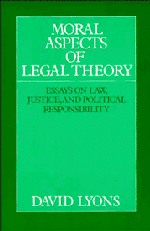Book contents
- Frontmatter
- Contents
- Preface
- Acknowledgments
- 1 The internal morality of law
- 2 On formal justice
- 3 Legal formalism and instrumentalism - a pathological study
- 4 Moral aspects of legal theory
- 5 Formal justice and judicial precedent
- 6 Derivability, defensibility, and the justification of judicial decisions
- 7 Constitutional interpretation and original meaning
- 8 A preface to constitutional theory
- 9 Basic rights and constitutional interpretation
- 10 Critical analysis and constructive interpretation
8 - A preface to constitutional theory
Published online by Cambridge University Press: 10 December 2009
- Frontmatter
- Contents
- Preface
- Acknowledgments
- 1 The internal morality of law
- 2 On formal justice
- 3 Legal formalism and instrumentalism - a pathological study
- 4 Moral aspects of legal theory
- 5 Formal justice and judicial precedent
- 6 Derivability, defensibility, and the justification of judicial decisions
- 7 Constitutional interpretation and original meaning
- 8 A preface to constitutional theory
- 9 Basic rights and constitutional interpretation
- 10 Critical analysis and constructive interpretation
Summary
We have a plethora of theories about judicial review, including theories about theories, but their foundations require stricter scrutiny. This Essay presents some aspects of the problem through an examination of two important and familiar ideas about judicial review.
The controversy over “noninterpretive” review concerns the propriety of courts' deciding constitutional cases by using extraconstitutional norms. But the theoretical framework has not been well developed and appears to raise the wrong questions about judicial review. Thayer's doctrine of extreme judicial deference to the legislature has received much attention, but his reasoning has been given less careful notice. Thayer's rule rests largely on doctrines of doubtful constitutional standing.
The purpose of this Essay is not so much to answer questions as to raise them – to enlarge the agenda of constitutional theory.
INTERPRETIVE REVIEW
Constitutional scholarship has recently employed a distinction between “interpretive” and “noninterpretive” review, which concerns the range of norms used by courts in deciding constitutional cases. As the term suggests, “interpretive review” is based on interpretation of the Constitution; “noninterpretive review” is not so limited, but uses other grounds as well. Thus the normative theory that is labelled “interpretivism” accepts only interpretive review, whereas “noninterpretivism” approves of noninterpretive review in some cases.
These differences concern the core responsibilities of courts engaged in judicial review. They are not limited, for example, to crisis conditions, when courts might be thought to have special reason for departing from their normal role.
- Type
- Chapter
- Information
- Moral Aspects of Legal TheoryEssays on Law, Justice, and Political Responsibility, pp. 169 - 184Publisher: Cambridge University PressPrint publication year: 1993



